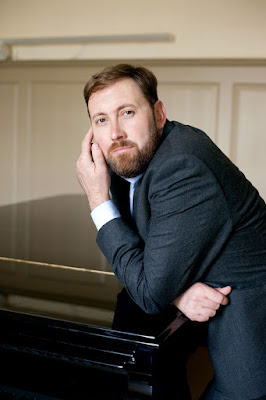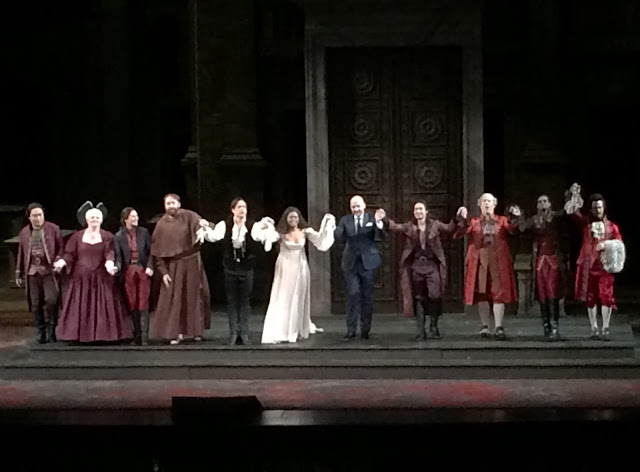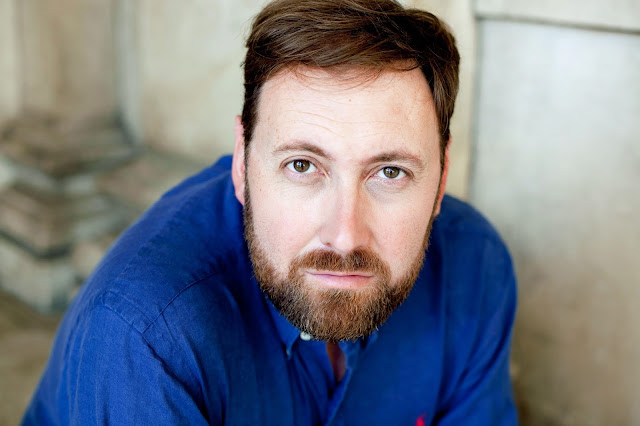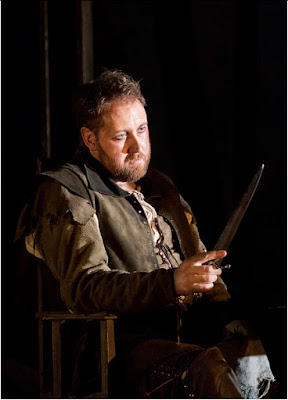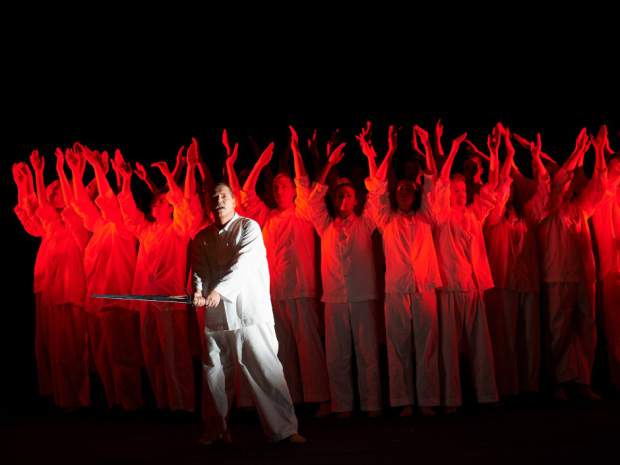 |
| (Michael Cooper / COC) |
2016 has been a terrible year. Between the loss of great cultural figures, a dramatically changing political landscape around the globe, and wars that feel tragically endless, it’s been a tough year for many to navigate, accept, or even survive.
However, I keep being struck by the strange reality that it’s been, on a strictly personal level, a really great year — especially when compared to my 2015, a year that was filled with loss, trauma, and horrible disappointments. 2016 was a year of discovery, delight, wonder. Sometimes it was hard to gel the beauty on a micro level with the hideousness on a macro one, but, to quote William Congreve, “music hath charms to soothe a savage breast, to soften rocks, or bend a knotted oak.” I saw a lot of great stuff this year; rocks were softened, oaks were bent, breasts were soothed — when not heaving in awe, a la Dangerous Liasons, that is.
Culturally, this was a good year in so many ways, but it was equally notable for being the first full music season I’ve experienced without my mother. I feel like she was with me throughout many, if not all of my travels, near and far, through good times and sad times and everything in between. I saw her make faces at some things, throw back her head and laugh at others, and clasp her hands in delight at yet more.
In the spirit of those hand-clasping moments, I present to you some of my favorite live music things from 2016. I confess I wasn’t actually planning to write about any of this; considering I write about and review music for a living, I want some of my own music-going to stay private and personal, free from analysis or too much thought, to live purely in a world of experience. I’ve found, however, that trying to turn off my critic’s brain is impossible. My mother would frequently admonish me, after a night of the opera and discussion, for “thinking too much.” I’m certainly guilty of this in more than the arena of music, but, I’ve learned over the last year to absorb more and analyze less, while still firmly embracing my thinky side; context matters, and insight is never a bad thing. I plan to continue cultivating my music love into 2017 and beyond, as you might guess.
Without further ado, here are my favorites from the year that was.
 |
| (Michael Cooper / COC) |
1. Siegfried, Canadian Opera Company; January
Richard Wagner’s epic work, written between 1856 and 1871, is the third part in the composer’s sprawling four-work Ring Cycle. Remounted by the COC (from a 2006 production) as a kind of surrealist nightmare, director Francois Girard dramatized elements inherent within the complex score to eye-catching effect. With tenor Stefan Vinke as a hero free of macho qualities but still very much in the throes of petulant youth, his was a performance that moved between lost, amiable, and enlightened, with the vocal agility to match. Michael Levine’s vivid stage design featured, in its first act, a tangle of branches rising above the hero’s head, a kind of physicalized thought bubble; later, a fiery hole with undulating hands housed the angry dwarf Alberich (a stentorian Christopher Purves), while Fafner, the giant-turned dragon, was staged with a pyramid of men and some very great choreography (by Donna Feore) and clever, intuitive lighting (by David Finn).
These elements, together with a unique “tree” threaded with bodies in its stark branches, and white-clad figures bathed and swaying in red light, produced an incredible vision of hellfire, damnation, temptation, and salvation. Wagner’s musicality was seamlessly integrated with the Ring’s inherent theatricality, and, together with some inspired singing (Vinke’s duet with Christine Goerke’s spitfire Brunnhilde was truly magical), worked to produce a hauntingly beautiful vision of Wagner’s mythological world.
 |
| (Ken Howard / Metropolitan Opera) |
2. Manon Lescaut, Metropolitan Opera; February
This production is included purely for the singing; I found Richard Eyre’s production silly and filled with what the New York Times rightly termed “troubling questions.” But Roberto Alagna, as des Grieux, and Kristin Opolais, in the title role, made music magic, the French tenor showing particular skill as he quickly substituted for an ill Jonas Kaufmann. Despite being ill with a cold himself on the day I attended, his was a thrilling, vivid performance, beautifully complemented by a luscious rendering of the score, thanks to Maestro Fabio Luisi. The women around me may’ve been sighing over Jonas’s absence, but to my ears, Alagna’s sonorous tenor was perfectly suited to Puccini’s rich-as-fudge score, and it was a treat to experience such an exquisite pairing, so beautifully executed.
Opolais, who’d already sung Manon opposite Kaufmann at the Royal Opera in 2014, brought an anguished drama to the role, and she and Alagna shared an electrifying chemistry, one that carried through (indeed, paraded over) Eyre’s bizarre staging. As New York Classical Review’s Eric C. Simpson noted, “When left alone, the principal actors were in fact able to carve stunningly real portrayals.” This was one of those special performances with such incredible lead performances, and conducted with such a charismatic mix of passion and majesty, I actually forgot the dire production — at least for a while. Impressive.
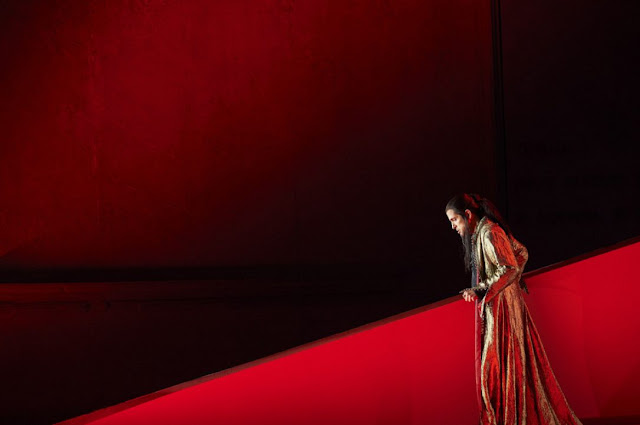 |
| (Michael Cooper / COC) |
3. Maometto II, Canadian Opera Company; April
Italian bass baritone Luca Pisaroni channelled silent film star Rudolph Valentino in a remount of a 2012 production from Santa Fe Opera. Director David Alden made effective used of the carefully wielded elements of dance and design (including a strong, expressionist-influenced color palette by designer Jon Morrell) to bring Rossini’s 1820 opera to vivid, stunning life. The title character’s dramatic entrance (which happens no less than fifty minutes into the opera) was impressively cinematic, and certainly a strong announcement of things to come in terms of Alden’s passionate approach to the material, to say nothing of the performers.
This was some of the finest singing I’ve ever heard at the Four Seasons Centre, bar none. Pisaroni’s full, rich bass baritone, his careful, loving attention to detail and controlled, luscious vibrato was matched by soprano Leah Crocetto’s Anna, who nimbly showcased a vivid coloratura as well as sweet timbre with a firm undertone that’s perfectly suited to the various shades of the character. Mezzo soprano Elizabeth DeShong, in the trouser role of Calbo was, in a word, shattering; the sustained applause at the end of her aria convincing Anna’s father of her innocence deserved every hearty “bravo” it received. David Laera’s sensuous choreography, especially the sinewy, swirling bellydancer who featured in the production’s second half, made for a gorgeous opera experience.
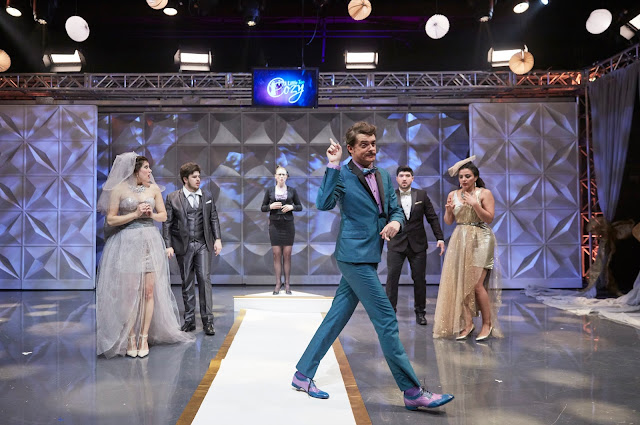 |
| (Darryl Block) |
4. A Little Too Cozy, Toronto; May
Against the Grain Theatre lived up to their name, going entirely… well, against the classical music grain in presenting Mozart’s Cosi fan tutte as a reality TV dating show, in an actual TV studio. The company, known for their unorthodox presentations of classical works, transformed the opera and its rather silly libretto into something relevant, smart, funny, and even moving. Was it Mozart? Was it opera? Yes and yes — and it was brilliant. Phone use and hashtags (#TeamDora, for instance) were actively encouraged throughout the performance. Seamless integration, between new and old, classical and contemporary, is AtG’s speciality, and they’re leading the way in reinterpreting opera for the 21st century in Canada.
It wasn’t only the premise that reeked of forward-thinking, risk-taking innovation; the actual performances were fun, knowing, and awfully familiar. Cairan Ryan’s smarmy game-show-host Donald L. Fonzo (Don Alfonso), did a charming buffo baritone, and was complemented by a very engaging, social-media-knowingness from the ensemble, comprised of tenor Aaron Shepppard (Fernando), baritone Clarence Frazer (Elmo), soprano Shantell Przbylo (Felicity), mezzo soprano Rihab Chaieb (Dora), and soprano Caitlin Wood (Despina). Smart, engaging, fun — A Little Too Cozy epitomized all the things indie opera is nudging grand opera toward, slowly if surely.
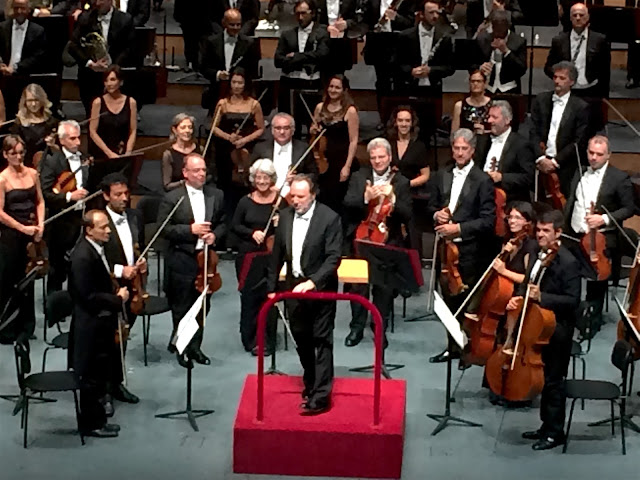 |
| (my photo) |
5. Filarmonica della Scala, Salzburg Festival; August
Riccardo Chailly led a masterful performance from the Filarmonica that only moved past the workmanlike and into the poetic in the event’s second half. Cherubini’s Overture in G Major and Symphony in D Major were, to my ears, strangely lacking in momentum and buoyancy; it was good, but not great, and certainly not what I expect from Chailly, whose work I’ve enjoyed (and seen) for many years. But, with Verdi’s divertissement of “Les Quatre Saisons” (the Four Seasons) ballet music from Les Vepres siciliennes (the pre-1861 version, later Italianized), the orchestra came alive, delivering a poetic performance that caught the small, quiet corners of the piece, and shone a gentle light that gradually became a shining beacon. The choice of placing the overture to Rossini’s Guillaume Tell at the program’s end was inspired too, with the famous piece providing a bouncy, boisterous close, if not conclusion, to the evening; the encore was an utterly thrilling performance of the overture to I Vespri Siciliani. I confess to sitting on the edge of my seat throughout its entirety.
Chailly is a fascinating figure to watch, his statesmanlike demeanor barely concealing a blazing fire, one he beams into orchestra members who spit it back in short controlled bursts or long, lean lines. I’d love to hear the Filarmonica play an evening of overtures; not only do they tell stories with their singing instruments, they conjure deep emotional states that move past the verbal and into the realm of the transcendent, rather like another orchestra…
 |
| (my photo) |
7. Berlin Philharmonic, Toronto; November
… yes, this one. The famed Berlin Phil embarked on a tour through North America this past autumn, showcasing the work of Mahler, Schoenberg, Webern, Boulez, Berg, and Brahms. Sir Simon Rattle was particularly interested in drawing sonic connections between them all, and he did a marvellous job of that, and much more, on the night I attended, with a program featuring Boulez’ Éclat and Mahler’s Symphony No.7. With just fifteen players, Boulez’ sparse if powerful work showcased the various reverberations of the instruments being used (especially piano) and the complex, nuanced harmonies therein. Intricate attention was paid to color and shape, with Rattle coaxing a quietly intoxicating drama that revealed its composer to be the logical inheritor of Mahler’s sonic explorations.
Like the Boulez, Mahler’s 7th makes use of the guitar and mandolin, though with very different effect. This was bold, passionate playing from musicians clearly happy to be there and clearly in love with the work and their conductor, who managed to seamlessly connect the six movements of Mahler’s notoriously lengthy work into one perfect, poetic thought. Seriously, you had to be there. Vunderbar.
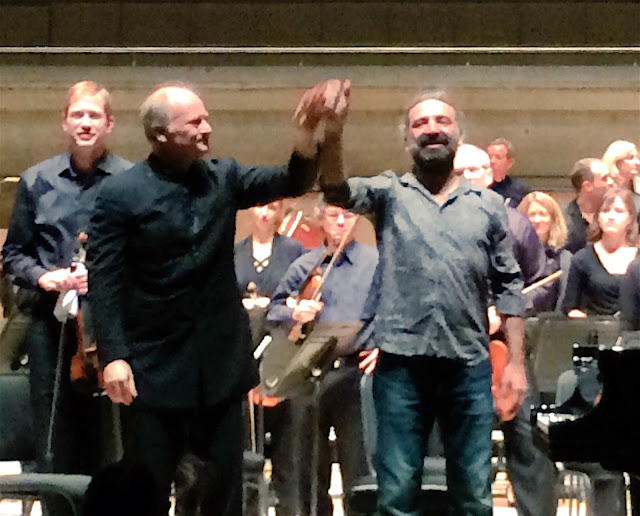 |
| (my photo) |
6. Stefano Bollani, at Koerner Hall / with the TSO and Gianandrea Noseda; November
The Italian jazz pianist moved easily and confidently between the worlds of classical and jazz during his visit to the city last month, interspersing appearances playing Ravel’s famed Piano Concerto in G with an evening of jazz (original compositions and more) at Koerner Hall. Musicality positively oozes from this man; his improvised introduction to the Ravel with the Toronto Symphony Orchestra (clearly unnerving to much of the Toronto audience) was full of characteristic playfulness and verve, while his loose interpretation of the Ravel brought all the whimsy and joy and pure musical curiosity that can sometimes go missing (or not be fully committed to) with more formal classical music performers. His connection with Noseda was also unmistakable, and it was fun to watch the two silently communicating, an invisible if entirely recognizable current of energy running between them. In addition to the playful Ravel, Bollani also performed a beautiful, improvised solo version of Leonard Cohen’s “Hallelujah” as an encore.
Experiencing Bollani do jazz one night and classical the next, I sensed a beautiful kind of sonic continuum and again, an unmistakable joy in simply making beautiful sounds. Amen and bravo, Stefano! Torna presto!
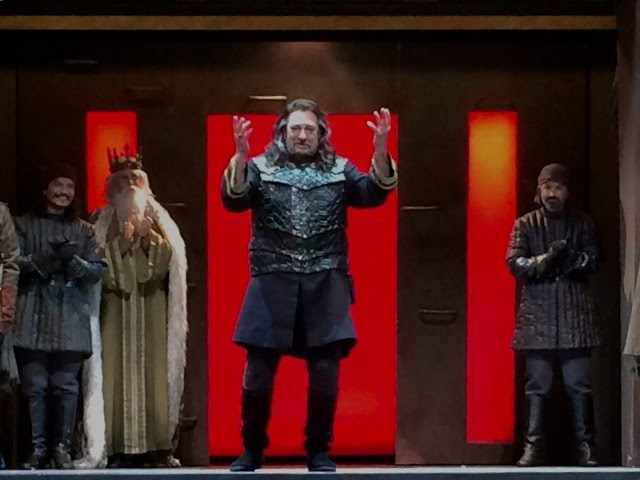 |
| (my photo) |
8. Macbeth, Los Angeles Opera; October
Many people have suggested at some point or another that Placido Domingo might want to consider retiring. Yet when all the elements are in place (as with Nabucco, currently on at the Met), there’s just something undeniably powerful about the tenor-turned-baritone; when he turns it on… the hairs on the back of your neck stand up. I went to Macbeth not expecting to be moved; I went for more sentimental reasons, to see a living legend who I had not seen live since 1993, at the Met in Verdi’s Stiffelio. The times I’d heard him as a baritone (so-called “baritenor”) I’d not been terribly impressed… and yet I found myself won over. Despite the layers of makeup and wigging, Domingo used his age and experience to fuel his characterization, and though the voice is grainy, it is still powerful, resonant, and undeniably exciting. His Scottish king wasn’t a sullen brat at all, but a capable, smart army man who resented been passed over one too many times. His scenes, particularly with a wonderfully fiery Ekaterina Semenchuk as Lady Macbeth, were filled with rage, regret, and finally even, remorse. This was very special, and very worth the trip to LA Opera. I’ll be back.
 |
| (Dahlia Katz) |
9. Naomi’s Road, Toronto; November
Tapestry Opera presented a timely vision of Joyce Kogawa’s novel about her experiences growing up in an internment camp during the Second World War. Originally conceived and directed by Ann Hodges, with sets and costumes designed by Christine Reimer and built by Vancouver Opera, Tapestry Artistic Director Michael Mori’s Toronto presentation presented a simple, powerful show (without intermission) in a local neighborhood location loaded with historical meaning; St. David’s Anglican Church is the home of the last Japanese-Canadian Anglican parish in Toronto. The fact there was (and is) talk of internment camps in the news lately made this work all the more poignant, of course, but also brought with it an urgency that added to its quiet theatricality.
The production poetically integrated design, theme, and musicality that spoke softly if powerfully. With just one pianist and four exquisitely talented singers, including mezzo soprano Erica Iris, who made an incredible transformation from imperious older woman to girlish bully, a switch which was both vocally and theatrically thrilling. Entire worlds were created and explored with grace, economical elegance, and deep sensitivity. This was easily the most humble production I saw this year; it was also one of the most memorable and important.
 |
| (Ken Howard / Metropolitan Opera) |
10. L’Italiana in Algeri, Metropolitan Opera; October
Straight up, this was the most fun thing I saw this year; it had laugh-out-loud moments and a boisterous, bright Met Orchestra led by Maestro James Levine. Rossini’s comic opera revolves a kind of comic, sitcom-like face-off that masquerades about being between East and West, but is really about men and women. Jean-Pierre Ponnelle’s 1973 production is full of the kind of cliches that make you both laugh at their preposterousness and wince at their overuse. As New York Times classical writer Corinna da Fonseca-Wollheim noted, “this battle of the sexes, framed by Rossini and his librettist as an abduction drama, may be the silliest and most stereotype-laden production in the Met’s repertory. But it’s still very funny — irresistibly so, as I found out.”
I’m on the fence about whether or not some of those tacky old costumes need to go; there’s a line between funny and tasteless, and I’m not sure that those those very deliberately fake-looking, hairy-Muslim-dude ones are entirely worth keeping. Sure, we can laugh because they’re preposterous and tasteless, but… they’re still preposterous and tasteless. They do, however, fit with the overall feel of the work itself, which is exaggerated, ridiculous, and extremely smart about presenting its true conflict as crazy comedy gold. Mezzo soprano Marianna Pizzolatti (a last-minute replacement for the ailing Elizabeth DeShong) was sprightly, funny, feisty, and highly watchable as the “Italiani” of the title, Isabella, and was beautifully complimented by a buoyant Met Orchestra under the baton of Maestro James Levine. To quote George Grella’s New York Classical Review piece, they handled Rossini’s bouncy score with a “crisp phrasing and a glinting sound.” For all my reservations over some costume designs, I still came away from this one smiling.
11. Faust, Salzburg Festival; August
Gounod’s famous 1859 opera got a modern treatment at the festival, with the immensity of the Grosses Festspielhaus being used in some marvellously creative ways by director/designer Reinhard von der Thannen. A meditation on nothingness – even the opening scene featured a neon “Rien” sign — this was an existentially-themed vision with cleverly integrated elements of commedia dell’arte and surrealism. It also featured entirely zesty onstage chemistry between tenor Piotr Bezcala (Faust) and bass baritone Ildar Abdrazakov (Mephistopheles), both in very fine voice; Beczala’s silvery-toned tenor and Abdrazakov’s cherry-chocolate bass not only made beautiful music together, but nicely channelled the drama within both Gounod’s score and von der Thannen’s vision, bringing the high-minded ideas behind the production to a recognizably human level. Still, the production itself was truly special. As philosophy professor Mirjam Schaub wisely notes in the excellent program essay,
Standing in opposition to the RIEN, of course, is a very substantial SOMETHING: the stage space. It is entirely white, impersonal, functional, open for light of all colours and at the time itself a non-colour.. […] That the stage space of Grosses Festspielhaus is somewhat CinemaScope-like in format is a factor very congenial to von der Thannen’s commanding and spatially expansive vein of fantasy.
No kidding. I’d love to see it at the Met; I suspect it would effectively carry to anywhere in the house. The bright design scheme, creative use of white space, glittering costumes, Giorgio Madia’s sinuous, kinetic choreography, combined with stellar singing and some very neat makeup effects made for a truly eye-opening and riveting Faust. Salzburg, traditional? Nein…
12. Don Giovanni, Salzburg Festival; August
… which segues nicely to my final selection. Don Giovanni is one of my favorite operas, but I’d never seen a production that vaguely satisfied me. Despite the exquisite score and fascinating characters, I always tended to walk out of any and every production feeling angry, frustrated, and utterly repulsed by the title character.
Then I saw Sven-Eric Bechtolf’s production at the Salzburg Festival; it was wickedly smart, truly moving, and funny. Imagine, a Don Giovanni that takes the comedy seriously — not as a pastiche or a collection of tacky, crude jokes, but rather, trusts the talents of its performers so deeply that it allows them to find their own comical moments, for themselves and with cast mates. This production was, quite simply, one of the most magical things I’ve ever experienced in an opera house.
Luca Pisaroni’s Leporello, for instance, was equal parts Jerry Lewis and Roberto Benigni, eminently comical and yet somehow relateably human. His was both an hilarious and touching portrait of a perennial wingman who fully realizes that, while he’d love to take the pilot’s seat, he is, at heart, not cut out for it. His interpretation of “Madamina, il catalogo è questo“ (the so-called “catalogue aria”) was the very best I have ever heard, filled with smart pauses, crisp diction, and a lively vibrato. Alain Coulombe brought cool authority and a quiet confidence to his portrayal of the Commendatore, a man clearly 180 degrees away from Giovanni, in both real and theoretical senses; he was order to the Don’s chaos, a minor key to his major; a firm, brief handshake instead of a warm, lengthy hug.
Physicality was, in fact, a very big part of this production, and Layla Claire threw herself into this aspect with bravado, giving the very best interpretation of Donna Elvira I’ve ever seen — wounded, but not at all simpering, and every bit as passionate and complex as Carmelo Remigio’s sexy Donna Anna and Valentina Nafornita’s feisty Zerlina, not to mention any number of maids in Bechtolf’s hotel-lobby-set production. All were agents of their own fate, each seeking a liberty (mental, emotional, particularly sexual) for themselves through the figure of this man they all want to possess, or be possessed by. It was hugely refreshing (and liberating) to finally see a Giovanni in which the women have agency, and to see not only them, but the main character freed from the their tidy, boring, cliche-ridden boxes of yore.
That theatrical approach, of course, made the title character fascinating and endearing in place of being smarmy and nauseating. It was so good to see a production — and a central performance — so firmly committed to breaking cliches while milking and gleefully mocking them at the same time. Ildebrando D’Arcangelo was, by turns, funny, sexy, hateful, annoyed, prideful, world-weary — in other words, warmly, defiantly human, which is impressive on its own, but doubly so for someone who’s performed the role numerous other times in numerous other productions, but here was very much playing an idea (“Viva la liberta!“), as Bechtolf’s smart program essay indicated. A key part of this characterization was, of course, vocal prowess: D’Arcangelo’s is a wonderfully agile voice with watchful subtlety in its upper tones, an unforced richness in low ones, a beautifully mellifluous vibrato with a mahogany-hewed timbre, and a nuanced approach to some well-known material (his “Vieni alla finestra” was easily the most perfect I’ve ever heard), and… well, to return to Congreve, oak bends, rocks soften. You figure out the rest.
That’s the year that was. Just to make the circle complete, Sven-Eric Bechtolf is set to direct Stefan Vinke in Siegfried at the Vienna State Opera in May. Am I going? You’ll have to wait and see. That Oscar Wilde quote about temptation, so relevant to Bechtolf’s Don Giovanni, could very become relevant to my life in 2017. We shall see; I am keeping an open mind, and looking forward to more adventures.

